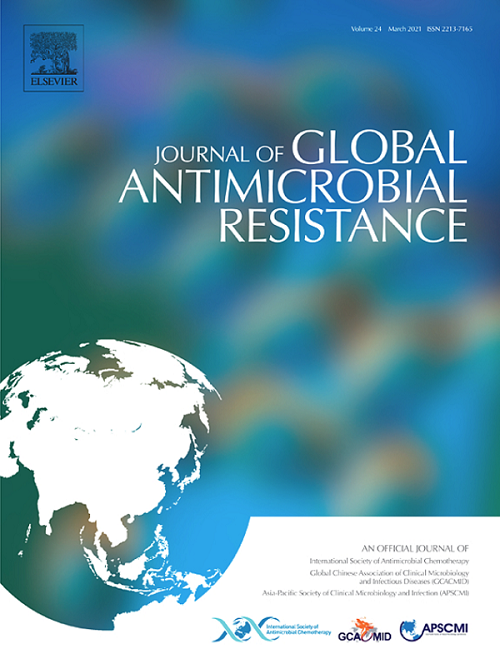Unravelling the advances of CRISPR-Cas9 as a precise antimicrobial therapy: A systematic review
IF 3.7
3区 医学
Q2 INFECTIOUS DISEASES
引用次数: 0
Abstract
Antimicrobial resistance is a critical public health threat, compromising treatment effectiveness. The spread of resistant pathogens, facilitated by genetic variability and horizontal gene transfer, primarily through plasmids, poses significant challenges to health systems.
Objective
This review explores the potential of Clustered Regularly Interspaced Short Palindromic Repeats (CRISPR) technology and Cas9 nucleases in combating antimicrobial resistance.
Methods
The literature review followed the PRISMA guidelines using PubMed, Embase, and Scopus databases until July 2023.
Results
The Enterobacterales family, particularly Escherichia coli, was the main focus. The resistance genes targeted were mainly associated with β-lactam antibiotics, specifically bla genes, and colistin resistance linked to the mcr-1 gene. Plasmid vectors have been the primary delivery method for the CRISPR-Cas9 system, with conjugative plasmids resensitizing bacterial strains to various antimicrobials. Other delivery methods included electroporation, phage-mediated delivery, and nanoparticles. The efficacy of the CRISPR-Cas9 system in resensitizing bacterial strains ranged from 4.7% to 100%.
Conclusions
Despite challenges in delivery strategies and clinical application, studies integrating nanotechnology present promising approaches to overcome these limitations. This review highlights new perspectives for the clinical use of CRISPR-Cas9 as a specific and efficient antimicrobial agent, potentially replacing traditional broad-spectrum antimicrobials in the future.

揭示CRISPR-Cas9作为一种精确抗菌疗法的进展:一项系统综述。
抗微生物药物耐药性(AMR)是严重的公共卫生威胁,影响治疗效果。遗传变异和主要通过质粒进行的水平基因转移促进了耐药病原体的传播,对卫生系统构成重大挑战。本文综述了聚类规则间隔短回文重复序列(CRISPR)技术和Cas9核酸酶在抗AMR中的潜力。文献综述遵循PRISMA指南,使用PubMed、Embase和Scopus数据库,直到2023年7月。肠杆菌科,特别是大肠杆菌,是主要的焦点。所针对的耐药基因主要与β-内酰胺类抗生素相关,特别是bla基因,以及与mcr-1基因相关的粘菌素耐药。质粒载体一直是CRISPR-Cas9系统的主要递送方法,结合质粒使细菌菌株对各种抗菌素重新敏感。其他递送方法包括电穿孔、噬菌体介导递送和纳米颗粒。CRISPR-Cas9系统对重致敏细菌菌株的有效性从4.7%到100%不等。尽管在递送策略和临床应用方面存在挑战,但整合纳米技术的研究提供了克服这些限制的有希望的方法。这篇综述强调了CRISPR-Cas9作为一种特异性和高效的抗菌药物的临床应用的新视角,未来可能取代传统的广谱抗菌药物。
本文章由计算机程序翻译,如有差异,请以英文原文为准。
求助全文
约1分钟内获得全文
求助全文
来源期刊

Journal of global antimicrobial resistance
INFECTIOUS DISEASES-PHARMACOLOGY & PHARMACY
CiteScore
8.70
自引率
2.20%
发文量
285
审稿时长
34 weeks
期刊介绍:
The Journal of Global Antimicrobial Resistance (JGAR) is a quarterly online journal run by an international Editorial Board that focuses on the global spread of antibiotic-resistant microbes.
JGAR is a dedicated journal for all professionals working in research, health care, the environment and animal infection control, aiming to track the resistance threat worldwide and provides a single voice devoted to antimicrobial resistance (AMR).
Featuring peer-reviewed and up to date research articles, reviews, short notes and hot topics JGAR covers the key topics related to antibacterial, antiviral, antifungal and antiparasitic resistance.
 求助内容:
求助内容: 应助结果提醒方式:
应助结果提醒方式:


